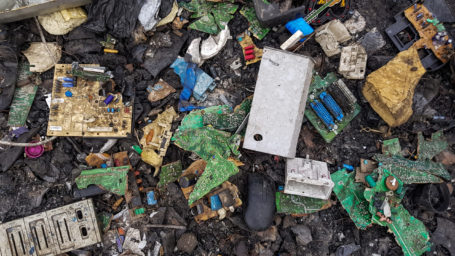
Representational Image. Muntaka Chasant, Electronic waste at Agbogbloshie, Ghana, CC BY-SA 4.0
Since 2016, when the Government of India notified the E-Waste (Management) Rules, several Producer Responsibility Organizations (PROs) set up operations for e-waste management in India. Yet several issues persist in terms of effectively enforcing and implementing these Rules.
The WEEE Forum is an international non-government association representing forty PROs across the globe, with Delhi-based PRO Karo Sambhav as its sole Indian member. The Forum facilitates knowledge and best practice exchange between organizations across the global e-waste value chain.

The WEEE Forum has established pan-European standards for the collection, handling, storage, transport, preparation for re-use, processing, and disposal of WEEE (an acronym for Waste Electrical and Electronic Equipment). We spoke with Brussels-based Mr Pascal Leroy, Director General – WEEE Forum, regarding the Forum’s efforts towards better e-waste management in India and abroad.
Q1. Could you tell us about the activities of the WEEE Forum?
The WEEE Forum is an International Association of Producer Responsibility Organizations (PROs). We were created in 2002 and have 40 PROs as our members, most of them in Europe, but also in India, Nigeria, Canada, Australia, and New Zealand – and our membership continues to grow.
The WEEE Forum was set up in the wake of a European Union directive that lay down Extended Producer Responsibility (EPR) for e-waste. All over the world similar legislation is being created and producers are teaming up to establish PROs. We saw an opportunity – but not for profit. The WEEE Forum and all its members are non-profit organizations. The GIZ is one of our major funders.
The WEEE Forum shares its experience with people who are planning to set up a PRO or manage an existing PRO. We help them understand their priorities, focus-area, skills, auditing processes, etc, and provide the required knowledge. We help them manage e-waste better through capacity building.
Q2. What are some of your most recent initiatives at the global level?
The WEEE Forum will soon issue a new policy paper outlining our vision for an enhanced definition of EPR. Among other things, we are asserting that producers and PROs will pay to manage 100 percent of the e-waste that they have access to, but cannot be held responsible for e-waste in the whole market. After all, we don’t have access to all the e-waste which enters the informal stream.
Another gap is in terms of e-waste collection from consumers. We are pushing for a bigger role for retailers and logistics companies in collecting e-waste directly from consumers.
Q3. Could you shed some light on your activities in India?
We are working with our Indian member Karo Sambhav to draft standardized norms for e-waste management. Standardization is essential to regulate the collection, sorting, handling, storage, transportation, treatment, and disposal of WEEE. Currently, these are voluntary standards but it is desirable that they become mandated by law.
Since we’ve already been through the standardization process in Europe and have a thorough understanding, we are translating these norms to meet India’s unique requirements.
Q4. How do you address the challenges posed by the informal sector in recycling, which handles 90-95 percent of e-waste in India?
Unlike Europe, where e-waste theft is a big challenge, developing countries like India have to deal with a large informal sector, which uses improper recycling methods that affect human health and the environment.
Admittedly, involving the informal sector is a difficult undertaking because they lose their competitive advantage if they are formalized. It would be a good practice to reach out to the informal sector and find a way to involve them – maybe register them on a platform so their role is identifiable and they can be brought to the discussion table.
It’s really important to bring together all stakeholders who have access to e-waste, whether it’s manufacturers, retailers, PROs, policymakers, and enforcement agencies. Once you have all of them on the discussion table, you assign responsibilities so that each one feels responsible for their role and does their utmost to contribute to better e-waste management.
We have observed that countries that set up coordination bodies tend to perform better in e-waste management than others. In countries that don’t make such an effort, everyone is blaming each other, unable to reach a solution. This is what initially happened in Europe. However, once we identified rules for each group, we made a lot of progress. This is our key experience in Europe, which we are also including in our upcoming position paper.
Q5. How can a level-playing field be created for all stakeholders in the business to ensure better recycling standards and producer compliance?
The problem is that there is no level-playing field. There is always someone circumventing the rules because enforcement is never good enough. However, enforcement is not just the police’s job – it also involves the prosecution and sentencing of those violating the rules, which are seldom a deterrent.
Governments need to strengthen enforcement. Those involved in nefarious activities should know that if they violate the rules and recycle e-waste irresponsibly, there will be a penalty to an extent that they don’t want to do it again.
Exactly a month ago, on October 14, the WEEE Forum organized the third edition of International e-waste day. As reported on SolidWasteIndia, Karo Sambhav and the US India Business Council (USIBC) hosted an online conference to mark the occasion on the theme “A circular economy in E-Waste for an Atmanirbhar Bharat”. A recording of the conference, including Mr Leroy’s presentation, is available here.
Picture Credit: Muntaka Chasant, Electronic waste at Agbogbloshie, Ghana, CC BY-SA 4.0



